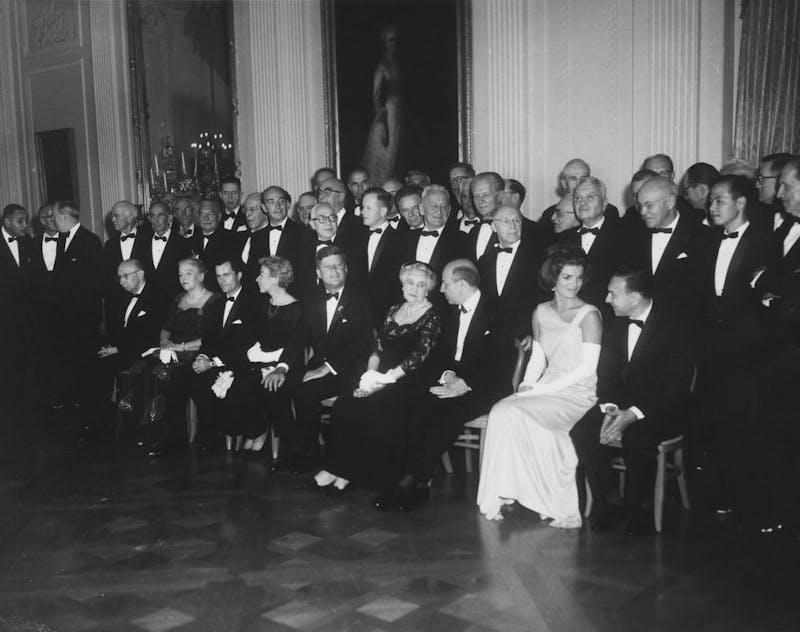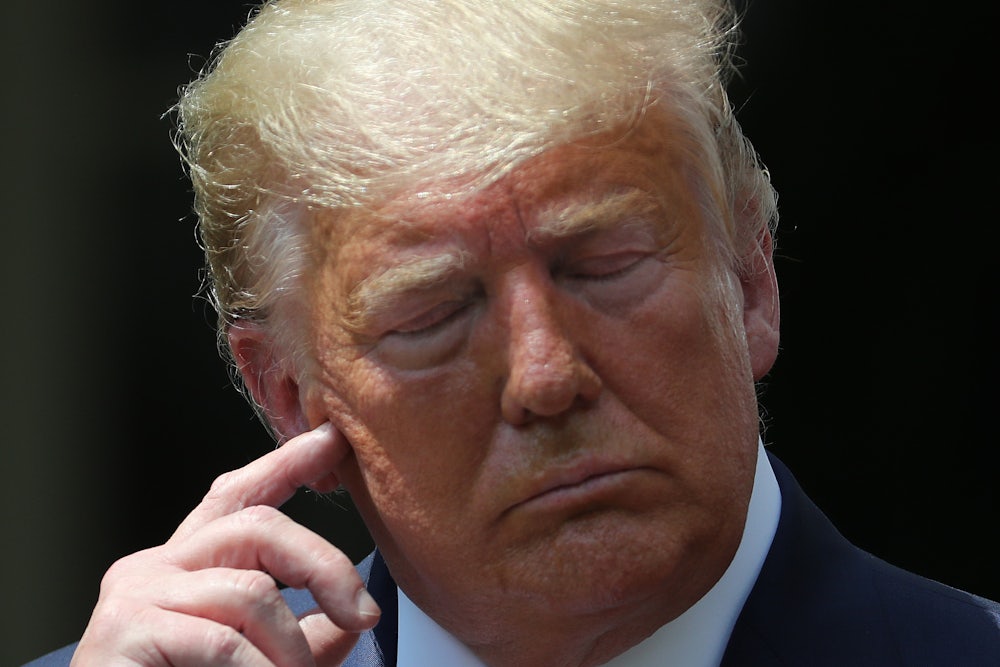A Washington
Post–ABC News poll taken the last week of May 2020 asked Americans,
“Do you think Trump has the mental sharpness it takes to serve effectively as
president?” Fifty-two percent of respondents said no, with only 46 percent
saying yes.
One might see this solid majority response as the weary, off-the-cuff judgment of an American public worn down by Trump’s barrage of outlandish claims about coronavirus treatments, or fantasized accounts of legions of violent antifa leaders orchestrating the present nationwide protests over the police killing of George Floyd. (Indeed, since that poll’s release, it was reported that Trump mistakenly tried to register to vote in his newly adopted home state of Florida using an out-of-state address.) But in truth, this was far from the first poll to find that a substantial number of Americans see Trump as not very bright. An Economist/YouGov poll in 2019 asked, “Compared to other presidents since World War II, would you say that Trump is more or less intelligent?” Forty-seven percent said that he is less intelligent, 22 percent said he has about the same intelligence, and just 21 percent thought he is more intelligent.
It appears that Trump’s performance in office has had a negative effect on perceptions of his mental acuity. The Quinnipiac poll tracked perceptions of Trump’s mental sharpness from 2016 through 2018, asking, “Would you say that Donald Trump is intelligent, or not?” When first asked in November 2016, 74 percent of people said yes, and only 21 percent said no. A year later, however, those answering in the affirmative had fallen to 55 percent, while those in the negative camp rose to 41 percent. Subsequent polls found roughly the same ratio.
Closely related to doubts about Trump’s intelligence is the question of whether he is too ignorant to do his job. In 2016 and 2017, the Fox News poll asked people, “Do you think Trump has the knowledge to serve effectively as president?” In the five times the question was asked, 60 percent of people said no and just 40 percent or fewer said yes.
Further evidence that Trump is widely viewed as something shy of the sharpest knife in the drawer comes from another, far-from-leading query pollsters have posed about him. In September 2017, a Washington Post–ABC News poll asked people an open-ended question: “What one word best describes your impression of Trump? Just the one word that best describes him?” The first most common term to describe him was “incompetent.” Other related characterizations in the top 10 descriptors included “idiot,” “ignorant,” and “unqualified.”
Quinnipiac asked a similar question in December 2017: “What is the first word that comes to mind when you think of President Trump?” By far, the most frequent word that came to mind was “idiot.” Other common terms included “incompetent,” “moron,” “ignorant,” and “stupid.”
Of course, Trump regularly refers to himself as a “very stable genius.” As proof, he often mentions that he got an undergraduate degree from the prestigious Wharton School of Finance at the University of Pennsylvania, after spending his first two years at Fordham. However, there is no evidence that he was anything other than an ordinary student. He didn’t make the list of matriculating students in his class who graduated with honors. Reportedly, one of his professors, William T. Kelly, later disparaged Trump as one of the dumbest students he ever had.
There is no evidence that Trump has ever sought the company of intellectuals or taken any advice even from those of a conservative persuasion. It’s absurd to imagine him hosting a dinner for 49 Nobel Prize winners, as John F. Kennedy did in 1962. (On that occasion, Kennedy said, “I think this is the most extraordinary collection of talent, of human knowledge, that has ever been gathered together at the White House, with the possible exception of when Thomas Jefferson dined alone.”)

Instead of touting knowledge for knowledge’s sake, Trump has
leaned into a different model of intellectual achievement, one that falls under
the broad heading of the familiar taunt, “If you’re so smart, why aren’t you
rich?” Throughout his career, Trump has maintained that the proof of his smarts
was in his fortune—that his early ascension to billionaire status reflected
superior worldly wisdom across the board. This is a long-standing article of
faith in American business folklore—the notion that great wealth and the conspicuous consumption
that accompanies it confer, by definition, an important benefit
to society. Trump contributes to this belief by implying that he is a self-made
man, rather than someone who inherited
the vast bulk of his wealth. He also grossly
inflates his net worth and downplays the extent to which it was achieved
through inside
connections and tax breaks rather than entrepreneurial skill. (In fact, Trump
would have made more money investing his inheritance in a
passive index fund than using it to finance his real estate empire.)
From the earliest days of his administration, it has been obvious to everyone who has come in direct contact with him that Trump knows very, very little about any policy issue or even how the federal government operates. Among those most alarmed by Trump’s ignorance and incompetence were those in the military and intelligence community. After a National Security Council meeting on January 19, 2018, Defense Secretary James Mattis told aides that Trump had the understanding of “a fifth- or sixth-grader.”
To this day, Trump pays very little attention to his intelligence briefings. He received repeated warnings about the coronavirus that he completely ignored—at great cost in terms of lives. Long after the seriousness of the pandemic became too serious for him to ignore and after many briefings on the subject, Trump continued to make ridiculous comments about unproven cures, including some that are simply nonsensical.
Trump’s mental failings are also painfully clear to foreign diplomats, who are professionally obligated to be frank and clear-eyed about him. Among themselves, diplomats early on shared tips on meeting with Trump: Don’t assume he knows anything about your country, flatter his ego, and be mindful of his extremely short attention span. It often appeared to aides that Trump didn’t even understand that other countries are in different time zones. He quickly became a “laughing stock,” as one unnamed official put it, at international meetings, where diplomats mocked his ignorance and limited vocabulary.
In 2017, Britain’s ambassador to the United States, Sir Kim Darroch, harshly assessed Trump’s intelligence and ability to function in office. In a cable to the Foreign Office, Darroch said, “As seen from here, we really don’t believe that this administration is going to become substantially more normal, less dysfunctional, less unpredictable, less faction-driven, less diplomatically clumsy and inept.”
When the French ambassador, Gérard Araud, left his post in 2019, he blasted Trump, comparing him to King Louis XIV: “You have an old king, a bit whimsical, unpredictable, uninformed, but he wants to be the one deciding.”
German Chancellor Angela Merkel was despondent at the 2017 G7 meeting, where Trump showed no awareness of climate change and rejected international cooperation to deal with it. According to Der Spiegel, “His speech was a break from centuries of Enlightenment and rationality. The president presented his political statement as a nationalist manifesto of the most imbecilic variety. It couldn’t have been any worse. His speech was packed with make-believe numbers from controversial or disproven studies. It was hypocritical and dishonest.”
In July 2017, Secretary of State Rex Tillerson reportedly called Trump a “moron” for his bungling and incompetence. That same month, National Security Adviser H.R. McMaster reportedly dismissed Trump as an “idiot” and a “dope” with the intelligence of a “kindergartner” at a private dinner. In 2018, White House chief of staff John Kelly called Trump “an idiot” on several occasions. A long list of other close Trump advisers have also disparaged his intelligence.
Nevertheless, throughout all his screwups, Trump has maintained fanatical support among Republicans. Yet occasionally a dissenting view will leak through, again exposing a harrowing view of the world’s most powerful man as he really is. On October 8, 2017, Republican Senator Bob Corker of Tennessee tweeted: “It’s a shame the White House has become an adult day care center. Someone obviously missed their shift this morning.”
Republicans are not blind to Trump’s shortcomings, although blind partisan loyalty generally keeps them on message in public, reserving their honest opinions to whispered comments behind closed doors. One who went public, however, was Erick Erickson, a former CEO of the popular Redstate.com website, a Republican hangout. In a rare moment of candor, he wrote in 2017:
“The president exudes incompetence and instability. Divulging classified information to the Russians through bragging; undermining his staff’s defense of his conduct through inane tweets; even reportedly asking the FBI director to suspend an investigation of a former adviser—all these strike me not so much as malicious but as the ignorant actions of an overwhelmed man. Republicans excuse this behavior as Trump being Trump, but that will only embolden voters who seek greater accountability to choose further change over stability. The sad reality is that the greatest defense of the president available at this point is one his team could never give on the record: He is an idiot who does not know any better.”
And that’s the assessment of an ideological fellow traveler; as the polling results and unvarnished assessments of global diplomats suggest that the president is not merely “overwhelmed” and that the idiot defense for his chronic incompetence and misconduct is more than a simply rhetorical tactic. With the Trump presidency, H.L. Mencken’s 1920 prediction that one day the White House “will be adorned by a downright moron” has now come true.
